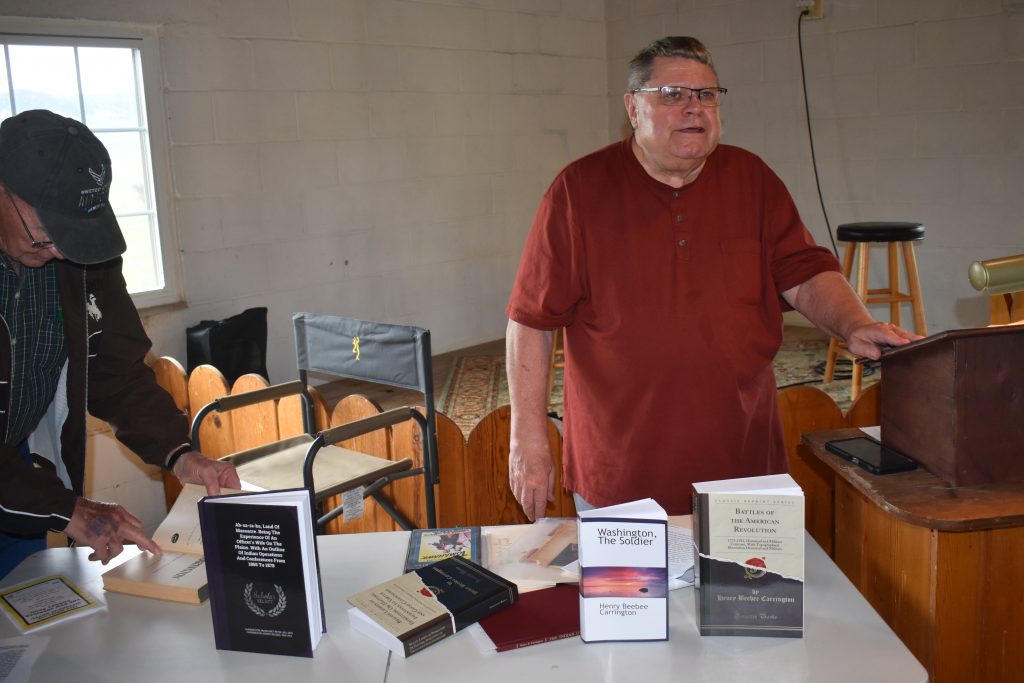News
Sonny Reisch Talks on Henry Carrington

Sonny Reisch
On Sunday, June 5, at 2 p.m., Sonny Reisch a Sheridan native, who served as the superintendent, historian and curator of Fort Phil Kearny for 25 years gave a talk on Colonel Henry Carrington.
Reisch has published several articles on the Bozeman Trail, the Indian Wars and Fort Phil Kearny. Around 30 people attended the program, held at Kearney Hall.
Reisch said that Carrington is a complicated character. While he was most famous for what happened during his six months at Fort Phil Kearny, during the 88 years of his life he experienced a number of interesting and important events.

Henry B. Carrington was born on March 2, 1824 and was a lawyer, professor, author, and U.S. Army officer. As commander of the 18th Infantry, Colonel Carrington was tasked to establish forts in Powder River Country after arriving in late June of 1866 and began construction of Fort Phil Kearny on July 13, 1866.
Reisch said that Carrington was sickly, and he was a carrier of tuberculous, which eventually caused the death of his first wife, Margaret. “He had a great mind, but his body couldn’t match his other gifts, and what he wanted to do,” he said.
Reisch said he usually talked about Carrington’s six months at Fort Phil Kearny, but on Saturday he talked about Carrington, the man.

He was not only the commander at Fort Phil Kearny, but he was also a writer. He wrote and published several books, Battles of the American Revolution; Washington, the Solider; Battle Maps and Charts of the American Revolution; The Exodus of the Flathead Indians, among others.
Carrington’s wife first wife, Margaret, accompanied him to Fort Phil Kearny, and wrote about her experiences there in the book, Absaraka, Land of the Crows, which was published in 1868. After his wife’s death, Carrington published eight more editions of the book, editing and adding addendum on the Indian Wars. The book is considered a classic and is still in print.
Carrington had some sympathy for the Indians. He wrote a little book titled The Indian Question in 1884, after he left the service. One quote from the book,
He talked about the Indian culture and why the Indians mutilated the victims and he talked about the Indians lifestyle and about the Indians viewpoint. “It’s a great little book,” Reisch said. “It gives the reader an idea of one frontier soldier’s opinion of the Indians.”
It was an attitude on the Indians that wasn’t too popular with the civilians or soldiers.
Carrington also took exception to the harsh, often brutal discipline that was often practiced at Fort Phil Kearny, and he gave orders that officers should not beat up on the soldiers, which didn’t make him popular with many of the other officers.
Reisch also stated that Carrington had orders to move to another command before the Fetterman Battle.
On July 3, 1908, Henry B. Carrington, his second wife, Frances Grummond Carrington, and some of the veterans of the Fort Phil Kearny garrison, returned to Sheridan to attend a memorial ceremony to dedicate the Fetterman monument. They recounted the events surrounding the battle and their experiences at the fort.
Carrington died in Boston, Mass., on October 26, 1912, at the age of 88.
After Reisch’s talk, the New Sheridan Cornet Band played several selections of 1860s music, and their story will be posted on Tuesday.


Ted Karam
July 7, 2022 at 3:26 am
Excellent! Wish I could have been there. Is it possible to get the talk in its entirety for a lifetime Bozeman Trail Association member? Thanks, Ted